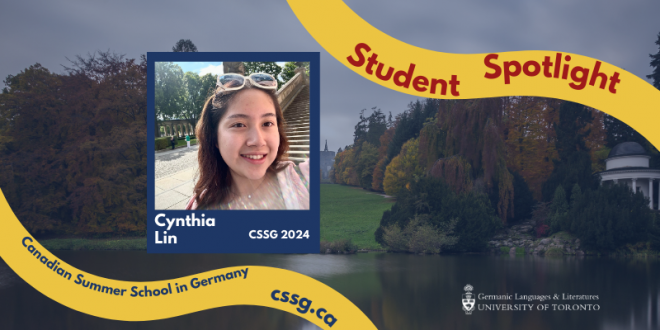Undergraduate Student Cynthia Lin spoke with us about her experience with the Canadian Summer School in Germany in the Summer of 2024. Cynthia is a Psychology specialist with a major in Sociology and a minor in Education and Society. She reflects on her experience with the program and shares some noteworthy advice for prospective students.
Good afternoon, Cynthia. Please introduce yourself to the community with your name, programs of study, and the year you participated in CSSG.
My name is Cynthia Lin, and I am currently enrolled in the psychology specialist program, the sociology major and education and society minor.
Please let us know what motivated you to apply to CSSG.
I first learned about this program through a UofT newsletter, and Professor John Plews, the CSSG Program Director, came to speak with us about it. I was motivated by my desire to immerse myself in the language experience and environment. I cannot gain the same fluent German language skills and cultural understanding in Canada.
What previous experiences did you have learning German before joining the program?
I previously studied GER 100Y1 (Introduction to German) online. Although the course was very interactive, it was not the same as taking a language course in person, so I struggled with my listening comprehension. When speaking German daily, people speak faster, more naturally, and colloquially. Studying in Germany would put me in a better position to continue my studies in Germany at UofT, so I did the equivalent of GER 200 (Intermediate German I) in Kassel.
Thank you. The next question is about the learning environment in Kassel. What were your classes like?
The classes were very small, which helped because we had more specialized teacher support. We had two Professors who held office hours in the afternoons after lectures. We would work together in a cafe, where you could ask questions and interact with them one-on-one, which was very beneficial.
Regarding course content, we focused on grammar, but not as much as we would in a first-year German class. It was about expanding your vocabulary and getting used to communicating in different contexts. We learned German songs, covered different vocabulary topics, and learned about other German-speaking countries. Our courseload was very manageable.
It felt like I was learning German the way I had learned English as a kid because we learned songs and played games, which felt more relaxing and helpful instead of only taking notes.
Living with a host family is an important part of the program. What is the value of living with a host family while studying abroad?
All students can have different experiences with their host families, but all friends I have talked to had a positive experience having a home in Germany where they felt safe. I had a great connection with my host family, for which I am grateful. My host had been participating in the program for many years. I helped her with her vegetable garden, and she helped me learn their names in German. I learned about her family, and it was interesting to learn what a German household is like.
What other experiences did you have studying abroad? For example, did you travel?
I travelled a lot with friends, some of whom travelled every weekend and were also CSSG participants. Travelling with a group of people is essential when it is your first time in another country, although it felt safe to travel in Germany. We went to Salzburg in Austria and Brandenburg and Leipzig in Germany, which I found to have remnants of the past Soviet rule. As CSSG participants, we were treated as adults, so we had a lot of freedom. Travel was definitely one of the highlights.
How has your experience studying abroad in Germany with CSSG improved your German language comprehension?
My day-to-day fluency is good now. I can express myself and understand what others are saying, but using academic expressions is still difficult.
Regarding interactions and daily life, we had a language contract as part of the program, which required us to commit to speaking only German with our peers when possible. We were also assigned children’s novels. There were more difficult readings in the third and fourth-year classes, but the children’s novels were still challenging for us in the second-year class. We had to do a journal entry each day and then submit it every week. This all sounds like a lot, but you shouldn’t let it deter you. You can still have free time to hang out with friends. You can balance both work and leisure if you are motivated.
What would you say are other key benefits of the program aside from language acquisition?
One of the most important benefits is the interpersonal skills you develop from participating in this program. Living with your host family can be challenging with a language or culture barrier. You will need to learn how to navigate this and remember to be direct and respectful in your communication.
What advice would you give students considering applying to the program?
Don’t worry too much about how you will do in the program. You are there to enjoy yourself, get to know the culture, and explore Kassel and Germany. Regarding your academic performance, you will have very supportive teachers, fun activities and go on field trips. All of these components contribute to improving your overall performance in the course.
Thinking about joining CSSG in Summer 2025? Visit cssg.ca for application requirements and guidelines!
Feel free to email german.undergradadmin@utoronto.ca for any questions.
 Department of Germanic Languages & Literatures University of Toronto
Department of Germanic Languages & Literatures University of Toronto


